- Home
- John Harris
Road To The Coast
Road To The Coast Read online
Table of Contents
Copyright & Information
About the Author
Part One
One
Two
Three
Four
Five
Six
Seven
Eight
Part Two
One
Two
Three
Four
Five
Six
Seven
Eight
Nine
Ten
Eleven
Twelve
Part Three
One
Two
Three
Four
Five
Six
Synopses of John Harris Titles
Copyright & Information
The Road To The Coast
First published in 1959
© Juliet Harris; House of Stratus 1959-2012
All rights reserved. No part of this publication may be reproduced, stored in a retrieval system, or transmitted, in any form, or by any means (electronic, mechanical, photocopying, recording, or otherwise), without the prior permission of the publisher. Any person who does any unauthorised act in relation to this publication may be liable to criminal prosecution and civil claims for damages.
The right of John Harris to be identified as the author of this work has been asserted.
This edition published in 2012 by House of Stratus, an imprint of
Stratus Books Ltd., Lisandra House, Fore Street, Looe,
Cornwall, PL13 1AD, UK.
Typeset by House of Stratus.
A catalogue record for this book is available from the British Library and the Library of Congress.
EAN ISBN Edition
0755102231 9780755102235 Print
0755127552 9780755127559 Mobi/Kindle
0755127838 9780755127832 Epub
This is a fictional work and all characters are drawn from the author's imagination.
Any resemblance or similarities to persons either living or dead are entirely coincidental.
www.houseofstratus.com
About the Author
John Harris, wrote under his own name and also the pen names of Mark Hebden and Max Hennessy.
He was born in 1916 and educated at Rotherham Grammar School before becoming a journalist on the staff of the local paper. A short period freelancing preceded World War II, during which he served as a corporal attached to the South African Air Force. Moving to the Sheffield Telegraph after the war, he also became known as an accomplished writer and cartoonist. Other 'part time' careers followed.
He started writing novels in 1951 and in 1953 had considerable success when his best-selling The Sea Shall Not Have Them was filmed. He went on to write many more war and modern adventure novels under his own name, and also some authoritative non-fiction, such as Dunkirk. Using the name Max Hennessy, he wrote some very accomplished historical fiction and as Mark Hebden, the 'Chief Inspector' Pel novels which feature a quirky Burgundian policeman.
Harris was a sailor, an airman, a journalist, a travel courier, a cartoonist and a history teacher, who also managed to squeeze in over eighty books. A master of war and crime fiction, his enduring novels are versatile and entertaining.
Part One
One
Flores, the little town of sun-baked brick sprawled beyond the crossroads, was crowded with vehicles as far as you could see, cars and farm trucks hemmed in with ox-carts and mule-waggons and tow-horse buggies and the battered colectivo buses that ran in the district. All the people who had felt it wiser to move out of the way of the shooting in the Córdoba-Santa Fè-Rosario triangle where the fighting had started, had been driven inwards – three ways at once, as it were – and were now being forced to concentrate in the square beyond the crossroads.
The dusty space in front of the church was full of people huddling their possessions to them as they sat in the shade under the low vaulted arcades, while the squawk of chickens and the bark of dogs added to the bedlam of noise. Someone was batting out an impatient tattoo on a car horn and an old woman was shrilly summoning a brood of children back to the cart from which they had strayed. Then a horseman, coming from the solitary store that looked as though it had been lifted out of a Western and plonked down just as it stood, galloped past, trying to get out of the town to the wide freedom of the plain before it was too late, his poncho, boots and black porkpie hat coated with a reddish-brown film. Immediately, everyone stopped shouting at each other to shout at him as he stirred up more of the fine powdery dust. It clouded everything with an opaque shadow like the first touch of death on a sick face. Even the lacy leaves of the eucalyptuses grouped among the brick and corrugated iron dwellings had been blanched by its colour…
Somewhere in the square, a goat was tethered to a cart and Harry Ash, sitting in the big red and black Cadillac convertible parked near a clump of giant gum trees, his lips rimmed with a hard crust of dirt, could hear it bleating in the heat of the afternoon.
It cried piteously and the sound came to him thin and penetrating, knifing its way through the maze of noises, irritating and disturbing at the same time, so that he found himself wishing to God he could close his ears to it.
Behind him, the traffic was closing up. Somewhere in the rear, guarding the crossroads, a battery of Peronist light guns on its way north to the trouble centres from the more loyal south was digging in among the thistles and, guessing what its presence there might bring in the way of retaliation once the revolutionary forces discovered it, everybody was trying to put as much distance as they could between themselves and the weapons. Ash had seen the unit as he had traversed the crossroads, had examined them as he passed the lorries and the tired men moving among the sparse trees.
He had watched them with a bright expert eye, remembering other guns, bigger guns and bigger battles, when not merely a government but a world, a whole way of life had been at stake; battles fought in a greedy African sun which had withered skin and bleached hair and, over the centuries, had reduced the land to a dust-bowl of sand, slaty rock and stunted bushes.
He was still fidgety with the thought as he sat in the car, switching the ignition on and off impatiently, slipping the gears in and out, itching to be away from this stodgy mass of immobility, and on the road again. But there seemed to be no question of movement at the moment. Just ahead, someone had got a lorry sideways-on to the traffic and the drivers of all the neighbouring vehicles were leaning from their seats and shouting abuse at him. For a while, the din increased as the occupants of vehicles farther back moved forward to investigate the hold-up then stayed to see the fun, standing in a half-circle, offering ribald advice to the harassed driver.
As the traffic jam grew worse, the petrol fumes hanging in the still air, Ash switched off the engine and sat back, listening to the driver of an ancient lorry converted into a colectivo shouting at the high-wheeled cart in front loaded house-high with domestic equipment.
‘Què ocurre?’ he was bawling imperiously. ‘What’s holding us up?’
The driver of the cart looked back at him but ignored him, then a mattress, which had been slowly slipping from his load for some time, landed with a plop on the road and the dust shot out from underneath it in a flat cloud. Immediately, two women jumped down and began to struggle to get the mattress back into place, while the driver shouted his instructions at them over the mound of furniture. Ash sat back, his legs along the seat against a briefcase that lay beside him, listening to the bus driver edgily playing trumpet calls on the horn. The intermittent blare of sound seemed to have no effect on the stooping women or on any of the people pushing past. Apart from an occasional glance in the bus driver’s direction, th
ey appeared not to notice him even.
At last, the women managed to get the mattress into place and climbed aboard, and immediately a group of pots and pans showered to the road from another part of the cart, and the women climbed down again accompanied by noisy protestations from the bus driver.
Ash lowered his legs and sat up straight in the car, gripping the driving wheel with one hand, the other hand on the ignition key, ready to start the engine and slam it into gear as soon as the road was clear enough to move. His big figure, indolent and careless-looking, belied the eagerness to get on that pounded inside him like a giant pulse.
While the women were stacking the last of the pans back, the roar of an aircraft began to swell out of the noises behind them, and the whole lot, the bus driver and all, jumped down and ran, so that Ash was left alone, beating gently in frustration on the rim of his driving wheel.
A British-built Gloster Meteor fighter from the insurrectionist airfield at Córdoba came howling over the trees and turned in a wide circle, the sun glinting on its square wings, then it headed east again in the direction of its base.
‘It’s gone,’ Ash shouted in English, standing up on the seat, a figure of splendid indifference. ‘Come on, you sloppy shower! Don’t start doing a bunk! It’s gone!’
Obviously no one understood a word he said – he didn’t expect them to – but his gestures, imperious and confident, were self-explanatory; and his rangy figure and the blazing red hair that topped a face which was commanding rather than handsome, like some dissolute Ney’s, had the effect of investing his movements with a degree of authority that caught the attention. Men and women began to emerge from under the trees into the sunshine, shamed by his scorn and his sharp bitter contemptuous words. ‘Come on,’ he shouted again. ‘Vámonos! Get moving, or they’ll be back again.’
He sat down once more and began to pump at the horn of the Cadillac, aware of the sweat in the palms of his hands and the greasiness that came from it on to the rim of the steering wheel. Then he tore off a stream of unexpected Spanish that made the people passing the car look up quickly at the picturesque bad language it contained, and sat back, satisfied with his efforts, as they began to move faster, shuffling in the dust, and started to climb on to the carts and lorries and into the cars again.
No one made any move to get the traffic going, though, and eventually they all climbed out again and stood about in groups arguing excitedly, clustering for the most part round the focal point of the flagstaff at the end of the square where the blue and white flag drooped in the heat, trying to make up their minds what to do, shouting at one another, complaining about the military, pushing inside the bars from the road and outside again to stare across the square or up at the sky for more wandering aircraft.
Nobody seemed to be panicking. It was as though they had seen sufficient attempts over the years by the ubiquitous military to overthrow one government after another that uprisings had become a common thing, and evil which had to be endured until their leaders were either triumphant or driven into exile. It was borne in on Ash as he watched, that for all their claims to be a democracy, the Argentines accepted as a habit and without question the authoritarian rule of any and all military governments in the capital whatever label they carried, and were quite prepared to sit back and wait until order had been restored.
Only a youth in front of a flat-fronted house ludicrously labelled “Pensión Lido”, seemed to object to the upheaval, and was gesturing frantically at an old man with an expressionless face like a wrinkled walnut who sucked at his yerba maté as though he had seen it all many times before and was quite undisturbed by any of it.
‘It’s the bourgeoisie of the army,’ the boy was shouting with the self-important gestures and the ready catchphrase of a budding politician. ‘The usual careerist military clique trying to impose a new kind of dictatorship on us. We have too much here in this country. That’s the trouble. We’re careless of our liberties.’
Nobody seemed to take any notice of him and, in fact, from the inside of the store came the sound of bidu dice and someone singing the ribald revolutionary “Cucaracha.”
In the distance, a sweating policeman was dodging about among the vehicles now, trying to bring some order into the chaos, and Ash, parked between the mule cart and the colectivo, was seething with frustration like a kettle coming to the boil.
‘Viva la Argentina,’ the youth was shouting, waving his hands at the unmoved old man with the tea. ‘Down with the army dictators! They’re always with us!’
Then the air contracted and expanded and a moment later they all heard the three-fold crack as the guns by the cross-roads opened up from their new position. A hundred-odd pigeons exploded into the sky from the roof of the church and the jammed vehicles were emptied of people again as if by a miracle. All who were left were Ash, sitting angrily in the Cadillac, and an old priest in a dusty black soutane and shovel hat standing by a roadside shrine with a crucifix in peeling gilt that leaned comfortably against a vast ombu tree which gave it shade and had probably been giving the spot shade for generations before anyone dreamed of raising a town there.
Ash sat staring at the sky while what seemed to be every dog in the place started barking, and the agitated squawk of chickens came through the gaps in the houses. Over it all, the chatter of voices and the frightened animal sounds, the metallic blaring of the Cadillac’s wireless came to him clear and strong, shouldering its way through the weaker noises.
‘–loyal troops are marching already against Curuzu Cuatía,’ the announcer was saying, ‘and more troops are at this moment entraining for the fighting round Córdoba. The secret police of Colonel Alvarado are conducting an intensive search for the insurgent leaders–’
Then the guns began to fire again and the words of the announcer were drowned once more as the chattering and the shouting in the square swelled up. Ash swore softly to himself, then, suddenly conscious of the sun’s strength, he took off his jacket and sat in his shirt sleeves, mopping his face.
The policeman had reappeared now and seemed to be making some impression on the jam so that people were beginning to return to their vehicles. Ash was stroking the bodywork of the Cadillac with a gesture of affection at the prospect of movement. The car, borrowed from an unwilling owner in Alta Gracia who had been hypnotized by Ash’s personality into offering it, represented his sole means of getting to the coast and out of the country to safety, and he had begun to regard it with a considerable degree of warmth by this time.
Suddenly the guns stopped and he looked up at the silence. It seemed ominous after the racket of the last quarter of an hour, and he realized that everyone else was looking up too and listening. Then he heard the roar of searching aircraft and understood at once why the guns had stopped firing. The mules alongside him twitched their ears. The few people who had emerged were standing in the doorways, waiting with the patience and passivity of their kind. The sound of the aircraft grew louder.
‘They’re after the guns!’ The driver of the mule cart began to climb down again from his perch. ‘Let’s hope, for the love of God, that their aim’s true,’ he shouted as he started for shelter. ‘The crossroads are near.’
As he began to hurry away, a Meteor shot into view over the houses, so close they could see the blue and white rondel on the wing, and everybody started running once more. The policeman disappeared from his position among the traffic and the priest from beside the shrine. The aircraft circled slowly in the distance and came round again looking for the guns. Then, while they were still watching it sidle to the east, the air was filled with the howl of another engine and a second Gloster came over the trees from the opposite direction, low down and fishtailing for position.
It had an ugly look of intention about it that Ash knew from experience and he grabbed his jacket and the briefcase and ran with the rest of them. As he reached the arch over a fruit shop door – a mere opening in a wall, its shutters plastered with advertisements for Firestone tyres a
nd Coca-Cola – he heard the rattle of cannon and dived behind a crate. As he hit the floor and slid to a stop by the wall, he saw from the corner of his eye the shells bursting in bright flashes against the stonework and heard the shriek of a falling bomb. The explosion as it landed just up the street dislodged some of the piled fruit; and peaches, pears and pineapples rolled from the rickety stalls on to his head.
‘María, Madre de Dios!’ An old woman at the back of the shop was down on her knees, her face to the ground, her black-garbed behind in the air like an ostrich with its head in the sand. ‘Holy Mother of God! Holy Mother of God!’
The atmosphere was suddenly clouded with dust that filled the nostrils as it jumped on all the ledges at the explosion. Everything, the road, the barking dogs, the frantic chickens, the standing vehicles, all seemed to have jerked at the concussion like a jarred motion picture and through the doorway, Ash saw splinters of wood sailing through the air in erratic arcs, and pieces of broken stone dropping with puffs into the roadway.
The second bomb fell among a group of trees across the road, whipping the bark off the eucalpytuses, the poplars and the red-flowered ceibos, shredding their branches as though with a many-bladed scythe. The thought that the next one might be doing the same very shortly to the hovel where he hid filled Ash with considerable alarm and he began looking round for a stouter shelter.
The crack as the third bomb landed made his ears ring, and he heard the whine of splinters through the trees once more, and saw leaves, severed from the branches, fluttering down. A scraggy chicken ran squawking on to the dusty road, its whole being expressing its panic, then as though caught by some trick of the blast, it flopped down abruptly, its wings spreadeagled, and lay fluttering and screeching in raucous agony.

 China Seas
China Seas The Mercenaries
The Mercenaries Road To The Coast
Road To The Coast The Thirty Days War
The Thirty Days War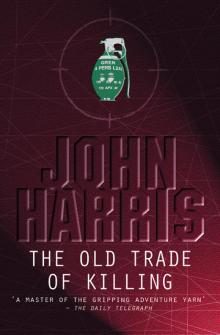 The Old Trade of Killing
The Old Trade of Killing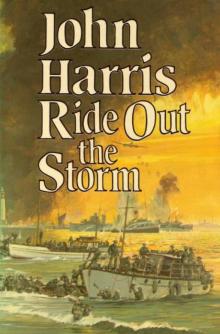 Ride Out The Storm
Ride Out The Storm Corporal Cotton's Little War
Corporal Cotton's Little War Fox from His Lair
Fox from His Lair Paint The Rainbow
Paint The Rainbow Flawed Banner
Flawed Banner Covenant with Death
Covenant with Death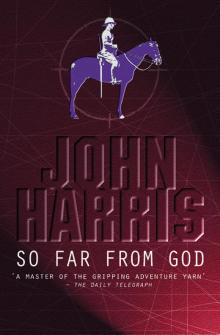 So Far From God
So Far From God The Sea Shall Not Have Them
The Sea Shall Not Have Them The Cross of Lazzaro
The Cross of Lazzaro Smiling Willie and the Tiger
Smiling Willie and the Tiger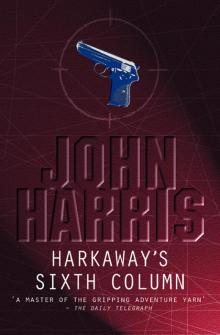 Harkaway's Sixth Column
Harkaway's Sixth Column The Sleeping Mountain
The Sleeping Mountain The Claws of Mercy
The Claws of Mercy North Strike
North Strike Picture of Defeat
Picture of Defeat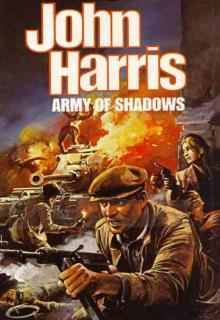 Army of Shadows
Army of Shadows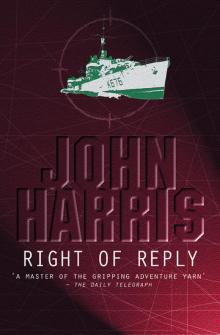 Right of Reply
Right of Reply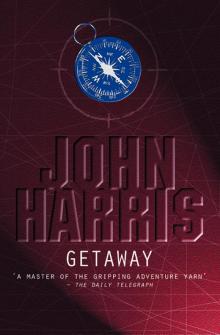 Getaway
Getaway The Lonely Voyage
The Lonely Voyage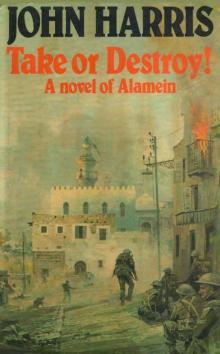 Take or Destroy!
Take or Destroy! The Backpacker
The Backpacker A Funny Place to Hold a War
A Funny Place to Hold a War Swordpoint (2011)
Swordpoint (2011) A Kind of Courage
A Kind of Courage